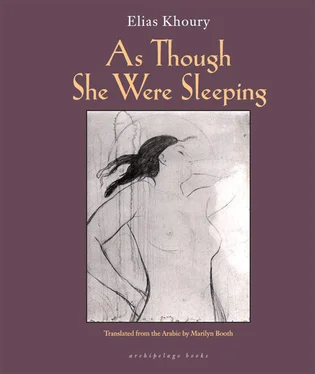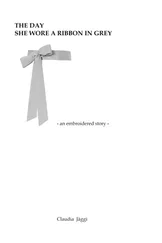The goblet? she asked him.
What goblet?
On the table, she said.
This glass, he said, picking it up, and it slipped from his hand to fall to the floor, covering the kitchen tiles in splinters of glass.
You broke it! she shrieked.
It’s nothing. Broken glass, broken bad luck. We have plenty more glasses just like it.
O Lord, what am I going to do now? She squatted to pick up the bits of glass. The shards sank into her palms and blood appeared.
What are you doing! he yelled at her. Get the broom.
She did not change position. She picked up all the glass splinters, put them in a tray and washed her hands in the sink. The water swirled down the drain dark red.
Blood, she said, and staggered as if about to faint. Help me, please!
He seized hold of her and half carried her to bed. He brought some cotton and antiseptic ointment that he dabbed along her fingers. He told her to go to sleep.
I’ll be back at midday. Don’t be afraid. Don’t make lunch, I’ll bring something from the souq .
Later, when she got out of bed, she found no trace of the glass shards in the tray. She cried hard and bitterly, weighted with the sense that she had committed a grave sin.
Without any advance warning Milia’s world had turned upside down. The news came and she found herself in Jaffa. She said she did not want to live in this city on the coast. She said she hated the house in Ajami which the widow shared with her two sons and mother-in-law. She said she was afraid of the roar of the sea. She said when she left Beirut she left behind the sea and she did not want to return to it. She said many things but all to no avail.
There in the church Amin’s coffin was cloaked in a four-colored flag. Everywhere, laments, weeping, and expressions of anger prevailed. Milia had never seen anything like the place in which she now found herself: a city roiling in fury, and specters of fear and hatred etched on people’s faces everywhere. Milia saw faces contorted by grief and a city sliding into its own death. She was afraid for her womb, apprehensive about the effects this city would have on her baby, whom — she feared — would drop into the tumultuous froth of Jaffa’s waves and disappear forever. On the face of her mother-in-law Najiba she saw permanently carved lineaments of despair.
You killed him, said Najiba to her son Mansour. The mother did not mean what she said — or she didn’t mean to let these words slip out — but she spoke as though for the moment she had appropriated the voice of the young widow, who did believe that Mansour was responsible for his brother’s death. Or she believed that his brother had died in his stead; not only had she lost everything but now she must live with the two young children and the old woman at the mercy of this Mansour who had fled Jaffa, leaving its death sentence for his brother.
There on the dust-swirled rise overlooking the sea Milia observed the change that had come over Mansour. Her husband stood motionless with the rest in the seaside cemetery where the Hourani family had buried their dead for a thousand years. When the coffin was lowered into the ground, a single sad ululation, a salute to the martyr, rose hoarse from the mother’s raw throat. In that moment Milia saw Mansour completely altered. The man seemed suddenly to shrink in size, his limbs contracting. Milia could not describe what she saw but it was as though she felt her husband’s joints congeal and collapse into an indistinguishable mass of flesh. And Mansour wept. From his insides erupted a peculiar howl as if the man were exploding, yielding a whole world of tears that poured from his eyes. Entering the home and seeing the women clustered around the corpse of his brother pierced by bullets, Mansour had not cried. His face had been contorted into a dreadful frown. Bending over his brother to kiss the dead man’s brow, he felt himself collapsing forward. His head met the pillow and he put his cheek next to his dead brother’s as the women’s sobbing and moaning grew louder and wilder. The mother said she saw tears rolling down the cheeks of the dead man. My Lord, he is still weeping for himself! she moaned. But these were Mansour’s tears, the widow said. And he must not cry these tears onto his brother’s cheeks — that’s taboo! she fretted. Milia recalled the tale of the poet Dik el-Jinn of Homs who killed his lover Ward. His tears welled across her cheeks as his poem soared.
O face on which the white dove lit
To pluck the self-sown fruits of ruin
I watered earth with her blood and saw
her lips water mine with passion
My sword ran firmly through her sash
And now my tears run o’er her cheek
No sole has trod the earth, I swear,
more dear than the slippers upon her feet
Milia did not understand the story’s import. What was this love about? A poet from Homs has two loves: a Nazareth woman named Ward and a boy called Bakr. She was not convinced by what Mansour had said about the practices and morals of the Abbasid age: that there was no harm in a man loving another man on condition that he be too young to have yet grown a beard as well as being of a sweet and comely appearance. The poet married Ward and installed Bakr in the same dwelling. When the poet was told that Bakr had fallen in love with Ward, had flirted with her, and had even slept with her during one of the poet’s journeys away, Dik el-Jinn — “rooster of the demons” — went devilishly mad and killed them both at once, together.
But the story has not really begun yet, not with this, said Mansour. The story begins when the poet discovers that the story he was told was one lie piled upon another and that Ward had not betrayed him after all. He went directly to the grave and scooped up two handfuls of soil, one from where Ward lay and the other from Bakr’s grave. He stirred them into two goblets and began to drink from each, weeping for his two beloveds and composing poetry. That is when he uttered the line And now my tears run o’er her cheek . Meaning, yes, he had killed her, but equally he wept over her out of love. That is true passion, my darling. True love.
That’s love!
Of course it is.
You mean, something that you kill for?
Of course I would kill for it. There is not a lover in the world who is not ready to kill or at the very least would not want his beloved’s death if she deceived him in love.
You mean, you could kill me?
It’s just a story, my love! As we say, it is the story of Dik el-Jinn. Everyone must live his own story. Dik el-Jinn killed Ward because that is what his story demanded. After all, people are stories. What is life, my dear? We live a story whose author we do not know. That is why I am afraid to read novels. Every time I read a novel I have the uneasy feeling that the writer is a brute. To entertain their readers, authors put their heroes in tragic circumstances. I feel my whole self squeezed and pressed inside a telling that goes on and on, as though at any moment I am liable to fall headlong out of life, lose my foothold, and pitch forward into the midst of a book. No. . poetry is better. Among the ancient Arabs poetry was the ultimate art because it is all description and no story. And to make stories attractive to listeners, storytellers used to insert a bit of poetry. Poetry was the sense and the story was the structure, and that’s the way it went.
You mean, you kill because the story says to kill?
Now your story begins, Mansour. . whispered Milia to herself. You tell me that a story begins only with murder and death: We tend to believe that a person’s story begins at birth, Mansour said. But that is not the case, my dear. The story begins when we die or when we kill.
Читать дальше












